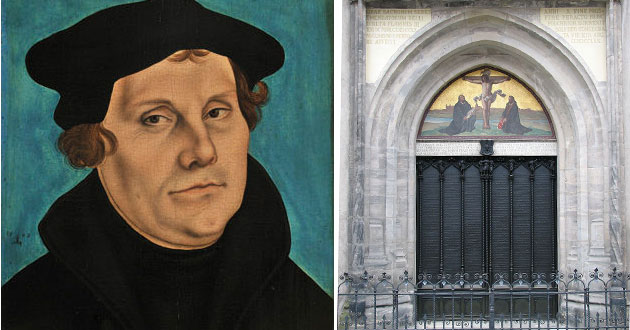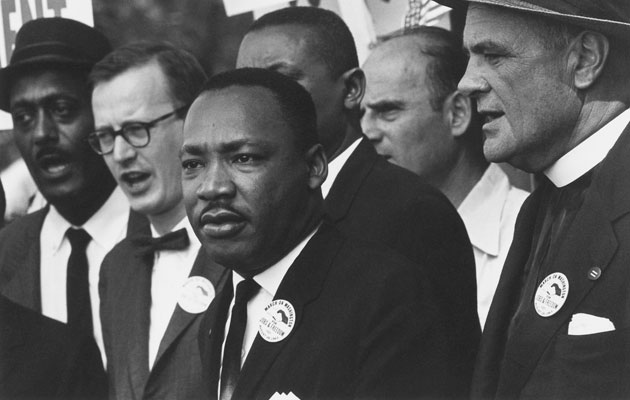On a cold, nondescript Jan. 15 in Atlanta, Georgia, Michael was born. Named after his father, he was the second child of a pastor and a school teacher. He was welcomed into this world in the usual way by family and friends. Later, in October of that same year, the Great Market Crash of 1929 would be the catalyst for the Great Depression.
When Michael was five-years-old, his father attended Fifth Baptist World Alliance Congress in Berlin and was fascinated with the life of the great German reformer Martin Luther. Returning to Atlanta, he changed both his and Michael’s name to Martin Luther.

Luther’s theses are engraved into the door of All Saints’ Church, Wittenberg. The Latin inscription above informs the reader that the original door was destroyed by a fire, and that in 1857, King Frederick William IV of Prussia ordered a replacement be made. Photo by By AlterVista | Wikimedia Commons
A few months after his 10th birthday, World War II began. For the next six years of his life, he would witness the deadliest conflict in human history that would eventually consume the lives of over 70 million people around the world.
While the war raged, young Martin excelled at his studies and graduated early from high school, skipping both ninth and twelfth grades. He then entered Morehouse College at the age of 15, where he earned his bachelor’s degree in sociology. He then entered Crozer Theological Seminary in Pennsylvania for theological training, where he received a Bachelor of Divinity degree and was elected president of his predominantly white senior class. From there, King went on to earn a doctorate in systematic theology from Boston University.
Inspired by his mentor, Dr. Benjamin Mays, a theologian and outspoken advocate for racial equality, King, at the age of 25, became a member of the executive committee of the National Association for the Advancement of Colored People. He began diligently working for the equal rights of African-Americans. He often encouraged those around him to join the budding movement, sharing, “The time is always right to do what is right.”
His family had only recently moved to Montgomery, Alabama when the highly segregated city became the catalyst that ignited the national civil rights struggle in the United States. Martin Luther King Jr. saw how the power of unity and a commitment to a just cause could change the world.
He organized a total boycott of public buses by the black community. That boycott ended up desegregating Montgomery’s public transportation system. He was identified as an emerging leader.
Inspired by the nonviolent tactics of Gandhi and building on his previous success in Montgomery — King was elected president of the Southern Christian Leadership Conference (SCLC). King’s goal was to consolidate the black churches, which would provide a national platform for organizing nonviolent protests to bring about civil rights reform. His words are as inspiring today as they were 66 years ago. He challenged people of all races in America to take a stand, “The ultimate measure of a man is not where he stands in moments of comfort and convenience, but where he stands at times of challenge and controversy.”
He would not – he could not back down from the racial inequities he saw around him. Bringing a spotlight on racial inequality, King had become a target for white supremacists. His home was firebombed one January night. And then, on September 20, 1958, Izola Ware Curry walked into a book signing event at a Harlem department store and asked, “Are you, Martin Luther King?” He replied, “yes.” She then stabbed him in the chest with a knife. King survived. The assassination attempt strengthened his resolve to nonviolence. Commenting on the ordeal, he said, “The experience of these last few days has deepened my faith in the relevance of the spirit of nonviolence. If necessary, social change is peacefully to take place.”
As the youngest recipient of the Nobel Peace Prize, he continued to work his strategy of nonviolent protest until he was assassinated in 1968 at the age of 39.
While he only lived a few short years, his life made a difference. Every year, on the third Monday of January, our nation celebrates the significant changes Martin Luther King, Jr. made in our nation. Our country is a better place because of the sacrifices he personally made to right the wrongs he saw in the world. His words still ignite righteous passion in our hearts when we recall him saying, “Injustice anywhere is a threat to justice everywhere.” His cause was good and noble. His passion propelled him to become one of the distinguished leaders in our nation’s history.
We should all be invigorated by the passion of great men and women throughout history. Their lives challenge us to be better people. We have a lot to learn from their struggles and the sacrifices they made to make the world around them a better place for the next generation.
One of the greatest lessons I have learned from Dr. King is that I cannot remain silent when I know I can make a difference. I agree when he once said, “Our lives begin to end the day we become silent about things that matter.”
Many things matter in our culture today, where, as Christians, we should not be silent. We die a little each day that we do not stand up for what is right. On the other hand, we are emboldened when we seize the opportunities before us to make the lives of others better.
I encourage you on January 20, 2020, the day we honor the life of Dr. Martin Luther King, Jr., to take a few minutes to let his life inspire you to make a positive difference in the world around you. People often believe they cannot make a difference. Dr. King would tell you,” Be a bush if you can’t be a tree. If you can’t be a highway, just be a trail. If you can’t be a sun, be a star. For it isn’t by size that you win or fail. Be the best of whatever you are.”
I am personally grateful for inspirational leaders like Dr. Martin Luther King, Jr., who inspire me to use my life to make positive changes.
 Mark Harris is the Founder and CEO of 4Tucson, a catalyst to mobilize Christians in Tucson to help solve the city’s toughest problems. Previously he spent 10 years as a financial consultant with Merrill Lynch in Houston, Texas.
Mark Harris is the Founder and CEO of 4Tucson, a catalyst to mobilize Christians in Tucson to help solve the city’s toughest problems. Previously he spent 10 years as a financial consultant with Merrill Lynch in Houston, Texas.

